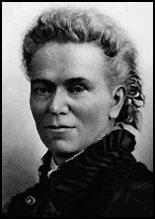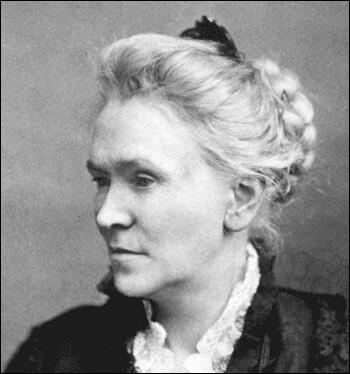Matilda Gage

Matilda Joslyn was born in Cicero, New York, on 25th March, 1826. When she was nineteen she married a successful merchant, Henry H. Gage.
In 1869 Elizabeth Cady Stanton and Susan B. Anthony formed a new organization, the National Woman Suffrage Association (NWSA). Gage joined the NWSA and in 1875 became president of the organization.
From 1878 to 1881 she published and edited the feminist newspapers, National Citizen and Ballot Box. She also wrote several pamphlets including Woman as Inventor (1870), Women's Rights Catechism (1871), The Dangers of the Hour (1890) and the book Woman, Church and State (1893).
Gage was also a historian of the struggle for women's rights and with Elizabeth Cady Stanton, and Susan Anthony, complied and published the four volume, The History of Woman Suffrage (1881-1902).
Matilda Joslyn Gage died in Chicago on 18th March, 1898.

Primary Sources
(1) Elizabeth Cady Stanton, Susan Anthony, and Matilda Joslyn Gage, History of Woman Suffrage (1881)
Susan B. Anthony, having been a successful teacher in the State of New York fifteen years of her life, had seen the need of many improvements in the mode of teaching and in the sanitary arrangements of school buildings.
In 1853, the annual (education) convention being held in Rochester, her place of residence. Miss Anthony conscientiously attended all the sessions through three entire days. After having listened for hours to a discussion as to the reason why the profession of teacher was not as much respected as that of the lawyer, minister, or doctor, without once, as she thought, touching the kernel of the question, she arose to untie for them the Gordian knot, and said, "Mr. President." If all the witches that had been drowned, burned, and hung in the Old World and the New had suddenly appeared on the platform, threatening vengeance for their wrongs, the officers of that convention could not have been thrown into greater consternation.
At length President Davies, of West Point, in full dress, buff vest, blue coat, gilt buttons, stepped to the front, and said in a tremulous, mocking tone, "What will the lady have?" "I wish, sir, to speak to the question under discussion," Miss Anthony replied. The Professor, more perplexed than before, said: "What is the pleasure of the Convention?" A gentleman moved that she should be heard; another seconded the motion; whereupon a discussion pro and con followed, lasting full half an hour, when a vote of the men only was taken, and permission granted by a small majority; and lucky for her, too, was it, that the thousand women crowding that hall could not vote on the question, for they would have given a solid "no." The president then announced the vote, and said: "The lady can speak."
We can easily imagine the embarrassment under which Miss Anthony arose after that half hour of suspense, and the bitter hostility she noted on every side. However, with a clear, distinct voice, which filled the hall; she said: "It seems to me, gentlemen, that none of you quite comprehend the cause of the disrespect of which you complain. Do you not see that so long as society says a woman is incompetent to be a lawyer, minister, or doctor, but has ample ability to be a teacher, that every man of you who chooses this profession tacitly acknowledges that he has no more brains than a woman? And this, too, is the reason that teaching is a less lucrative profession, as here men must compete with the cheap labor of woman. Would you exalt your profession, exalt those who labor with you. Would you make it more lucrative, increase the salaries of the women engaged in the noble work of educating our future Presidents, Senators, and Congressmen."
This said, Miss Anthony took her seat, amid the profoundest silence, broken at last by three gentlemen, walking down the broad aisle to congratulate the speaker on her pluck and perseverance. . .
To give the women of today some idea of what it cost those who first thrust themselves into these conventions at the close of the session Miss A. heard women remarking: "I was actually ashamed of my sex." "I felt so mortified I really wished the floor would open and swallow me up." "Who can that creature be?" "She must be a dreadful woman to get up that way and speak in public."
Miss Anthony attended these teachers' conventions from year to year, at Oswego, Utica, Poughkeepsie, Lockport, Syracuse, making the same demands for equal place and pay, until she had the satisfaction to see every right conceded. Women speaking and voting on all questions; appointed on committees, and to prepare reports and addresses, elected officers of the Association, and seated on the platforms. In 1856, she was-chairman of a committee herself, to report on the question of co-education; and at Troy, she read her report, which the press pronounced able and conclusive. The President, Mr. Hazeltine, of New York, congratulating Miss Anthony on her address, said: "As much as I am compelled to admire your rhetoric and logic the matter and manner of your address and its delivery I would rather follow a daughter of mine to her grave, than to have her deliver such an address before such an assembly ".
Superintendent Randall, overhearing the President, added: I should be proud, Madam, if I had a daughter capable of making such an eloquent and finished argument, before this or any assembly of men and women. I congratulate you on your triumphant success."

